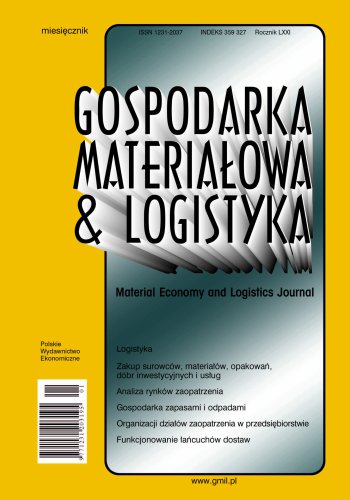Zmiany geopolityczne w Europie Środkowo-Wschodniej po 24 lutego 2022 r. — ujęcie logistyczne
Central and Eastern Europe has a special place in the logistics service of international trade, not only due to the strategic geographic location determining the transit position in the Trans- Eurasian supply chains. Also due to the significant share of services provided by enterprises located in the countries of the region. The outbreak of the armed conflict on February 24, 2022, initiated by the attack of Russian troops on the territory of Ukraine, should be considered a key determinant of changes in the economic ties that have existed so far. As a result of the so far made and expected subsequent decisions in the field of international political and economic relations, the region’s logistic connections will undergo reconfiguration. Importantly, their effects will be visible not only in the countries of Central and Eastern Europe, but also on a supra-regional scale.
The paper addresses the issue of the short and long-term effects of economic disturbances resulting from the Russian-Ukrainian war and their implications for the logistic service system. It is based on the perspective of geopolitical dependencies and changes in the strategic order, which is reflected in the ongoing crisis. The paper uses statistical data determining the hitherto involvement of individual countries in international flows and indicates the potential consequences of restrictions on international trade in goods. Ongoing conflict limitations in access to resources and the possibilities of their effective delivery in supply chains will cause far-reaching changes of global importance. Sanctions and retaliatory sanctions in Russia’s relations with the West, preventing the implementation of the current supplies from Ukraine covered by military operations, will shape the market selected goods and logistics services to a large extent. At this stage, it is important to be aware of the consequences of the conflict that has begun.
Europa Środkowo-Wschodnia zajmuje szczególne miejsce w obsłudze logistycznej handlu międzynarodowego. Wynika to nie tylko ze strategicznego położenia geograficznego, determinującego pozycję tranzytową w transeurazjatyckich łańcuchach dostaw, ale także ze znacznego udziału usług logistycznych świadczonych przez przedsiębiorstwa zlokalizowane w krajach regionu. Wybuch konfliktu zbrojnego 24 lutego 2022 r., zainicjowany atakiem wojsk rosyjskich na terytorium Ukrainy, należy uznać za kluczowy wyznacznik zmian w dotychczasowych powiązaniach gospodarczych. W wyniku podjętych i oczekiwanych kolejnych decyzji w zakresie międzynarodowych stosunków politycznych i gospodarczych powiązania logistyczne ulegają rekonfiguracji. Co ważne, ich efekty będą widoczne nie tylko w krajach Europy Środkowo-Wschodniej, ale także w skali ponadregionalnej.
W artykule poruszono kwestię krótko- i długofalowych skutków zaburzeń gospodarczych, wywołanych wojną rosyjsko- -ukraińską oraz ich implikacji dla systemu obsługi logistycznej. Opiera się on na perspektywie zależności geopolitycznych i zmian w porządku strategicznym, co znajduje odzwierciedlenie w trwającym kryzysie. W artykule wykorzystano dane statystyczne określające dotychczasowe zaangażowanie wybranych krajów w przepływy międzynarodowe oraz wskazano potencjalne konsekwencje ograniczeń w międzynarodowym handlu towarami. Wymuszone trwającym konfliktem ograniczenia w dostępie do zasobów i możliwości ich efektywnego dostarczania w łańcuchach dostaw spowodują daleko idące zmiany o znaczeniu globalnym, zaś sankcje i działania odwetowe w znacznym stopniu ukształtują rynek wybranych towarów i usług logistycznych.
Słowa kluczowe: Russo-Ukrainian war; logistics channels; resource availability changes; supply chains reconfiguration (wojna rosyjsko-ukraińska; kanały logistyczne; zmiana dostępności zasobów; rekonfiguracja łańcuchów dostaw)

